#ghost bridegroom
Text
Ghostly Brides and Bridegrooms
It’s nearly Valentine’s Day and love is in the air. But before you tie the knot with your beloved, you might want to make absolutely sure they are still among the living. For centuries, ghostly brides and bridegrooms have been common figures in folklore across cultures and have since worked their way into ghost stories and Gothic literature. From folk ballads of the eighteenth century to YA…

View On WordPress
#bridegroom#Folklore#ghost#ghost bride#ghost bridegroom#Lenore#Nothing But Blackened Teeth#She Is a Haunting#Specter Bridegroom#Sweet Williams Ghost#The Dybbuk#the ghost bride#The Skeleton Priest#Valentines Day
0 notes
Text
Kiss the Bridegroom - Codywan Kiss Bingo
Almost forgot! Have a saturday @codywankissbingo fill!! Set in a kinda paranormal 80s-or-whenever, 1.3k words! ----
It’s never been clear why he’s called the Bridegroom. As far as Ben knows, there’s a ghost dressed in Victorian white tie that occasionally gets distracted by the white flower in his lapel; there could be any number of events the man was going to go to, his own wedding being, frankly, far from the top of the list. But that sounds a lot less punchy when you dare someone to sneak into a mausoleum.
Ben is not afraid of ghosts. He believes in them, or at least has experienced his fair share of mysterious floating lights and creaky footsteps from an empty attic, but he sees no point in being scared of something that’s already dead. Unfortunately, when you tell your best friend this, he interprets it as a challenge, to somehow find the one paranormal activity that finally makes you shake in your boots. Ben doesn’t have the heart to tell him that spending the night in the mausoleum of what’s known to be a fairly chill spirit is not going to be the one that sends him running.
Quin had stood firmly outside the graveyard gates, getting blown in the wind with his broken umbrella bent permanently sideways, angled so the rain didn’t hit his grin, headphones still connecting him to the Walkman hitched to his belt. “You’ll love it,” he’d said, part sarcastic and part serious, and Ben had rolled his eyes and swallowed back the suggestion that now they’re nineteen, maybe they should have better things to do with their dark and stormy nights. Like watch a movie, or eat too much instant noodles and sour candy, or both simultaneously. Instead, he’d just said, “I don’t know why I let you talk me into these things.”
There are small violets blooming at the foot of the mausoleum, blustered around by the heavy wind and getting spattered by the rain, but remaining nevertheless secure to the where the old stone meets the grass. When Ben carefully tilts his hooded head up to see the architecture without getting rain in his eyes he’s just met with the weathered façade; any name that might have once been carved in has since been rendered unreadable by time and erosion. Hence the reliance on nicknames like the Bridegroom, then, who is said to walk around this area in lonely, despondent circles. It’s more sad than scary, really.
Surprisingly, the door swings readily open at a push, and with one last glance back to the dark blob of Quin, lifting an arm to wave, Ben ducks inside.
The sound of the storm is instantly muffled, reduced to just the rain on the mausoleum roof. There’s a drip somewhere, but otherwise the interior is just chill and eerily quiet, and if he didn’t know he was in a graveyard—if there wasn’t an actual tomb effigy lying there next to him—he’d think this was just the perfect shelter to wait out the rain before he continued home.
He flicks on his lighter and turns to peer at the Bridegroom’s effigy in the dim shadows. The closed eyes above a broad, straight nose, the proud chest covered in the stone facsimile of a waistcoat and tails. There’s a top hat tucked in his hand under his arm like he’s at a dandy’s version of parade rest; Ben trails his finger along the brim. How serene the face is, although—there’s either a crack in the stone or the detail of an actual scar along the effigy’s left temple. Ben moves his careful touch there, wondering if that’s how the Bridegroom died, or if it was from something else. Who was this man, before he was lost to time? What kind of things did he get up to when he was nineteen? The effigy looks young enough that he probably wasn’t far off from Ben’s age when he died.
And “the Bridegroom,” what kind of melodramatic name is that for someone who just looks like they’ve been buried in their best tux? As if he’d dropped in the middle of the vows and they’d tossed him into the graveyard without bothering to change.
To get a mausoleum to yourself, though, that has to mean something. Ben perches delicately on the edge of the tomb and runs a finger down a cobwebbed cheek. If the man really looked anything like this effigy then he was pretty handsome, probably getting swooned at by all the fine young ladies of the time. Or maybe the fine young men, too, Ben thinks; if he’d been alive in this town back then would he have lusted after him as well?
The rain pounds harder on the roof for a second, and Ben is delivered back into the present, with its stormy chill and his lighter flickering to the side. Spend the night, Quin had said. Try not to get spooked. “Dare you to touch him,” Quin would’ve probably said if he was here. “Dare you to give him a big ol’ smooch.”
Ben huffs a laugh through his nose and smirks at the effigy. Quin would definitely come up with something like that, especially if he could see how nice the Bridegroom looks. And why not, Ben thinks. It would be something to laugh with him about afterwards; yeah, I spent the night tucked in with the Bridegroom, and gave him something to remember for the rest of his rest.
“I don’t usually put out for guys who haven’t bought me dinner, first,” Ben teases to the effigy, brushing off the Bridegroom’s lips with his thumb and leaning down.
It’s his lips on stone, so really nothing to write home about. “It’s like you’re—” he starts to joke as he pulls back, cutting himself off when a wind suddenly blows through the mostly closed-off mausoleum. It extinguishes his lighter, leaving him in the pitch dark for the half-minute his eyes need to adjust, but he stays still, not frozen like a rabbit, but rather wary like a crow.
Until someone says, “Like I’m what?” and Ben lets out a small shriek.
He jolts back against the wall, away from the tomb and its effigy and the half-opaque figure sitting upright from it, swinging its legs over the side to sit sideways on—on himself. The Bridegroom runs a fading hand along his forehead and hair, like he just woke up from a nap, except one that has lasted for at least a hundred years.
Ben’s heart is hammering in his ribcage so loudly that he almost can’t hear his own voice when he says, stumbling over every word, “What is happening—who are—you’re the—what’s—what the actual fuck?”
The Bridegroom squints at him—a ghost is squinting at him—and says, “Who are you? You kissed me.”
“I did kiss you, why did I do that,” Ben rambles, feeling his own hand unadvisedly pull away from where he’s pressed against the wall. The Bridegroom furrows his brow a little, and Ben should not be finding that cute at a time like this, and then they’re touching flesh hand to ghostly fingers under a mausoleum roof in a rainstorm. Ben tries to will away the tingling in his lips. “I’m Obi-Wan, but people call me Ben,” he says, and then, because it’s the only question that feels relevant at this point, “were you really getting married?”
The Bridegroom frowns down at his shoes for a minute, while Ben tries not to feel self-conscious in front of a ghost. “I don’t remember,” he says finally, looking back up, and his expression makes something wring itself inside Ben’s chest.
He takes a step closer. “Maybe I can—” he starts, but what is he possibly able to do? He has a library card, though, and Great Aunt Jocasta works in the archives room at City Hall, so maybe he—“I can look it up for you. What’s your name?” The Bridegroom stares at him with a slowly downturning mouth, like he’s gradually coming to the conclusion that he’s not alive anymore. “Cody,” he says, more gently than anyone Ben’s been introduced to in his entire life. “Cody Fett.”
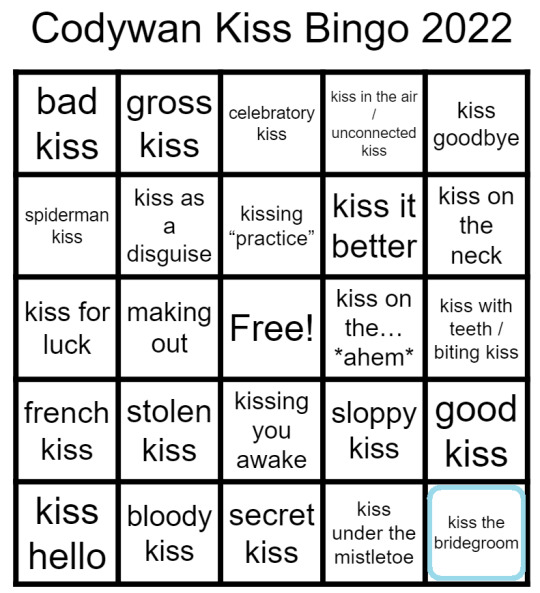
#those astute and well-read followers will know that the Bridegroom is a ghost character from leigh bardugo's book#Ninth House which I highly recommend!#codywan#codywankissbingo2022#my fic
92 notes
·
View notes
Text
can i be candid here i genuinely did not realiise that fu yao and nan feng were just mu qing and feng xin again. literally until its blatantly revealed when theyre going to the kiln... i think its partly a language thing because i didnt understand how obvious the fake names were but. when i rewatched s1 i realised they are even more obvious than the book and its actually laughable i didnt get it..i didnt understand the junior official lore so i was like of course theyre similar to their generals and proud of them and have beef because theri generals have beef:3
#when i watched s1 and hadnt read the book yet i also genuinely wasnt sure if hua cheng was evil..#like the ghost bridegroom stuff confused me and i didnt follow very well and i thought all the evil stuff was him#i also think i didnt understand that hua cheng was the kid or whatever#which again theyre like super obvious about in the donghua
3 notes
·
View notes
Text
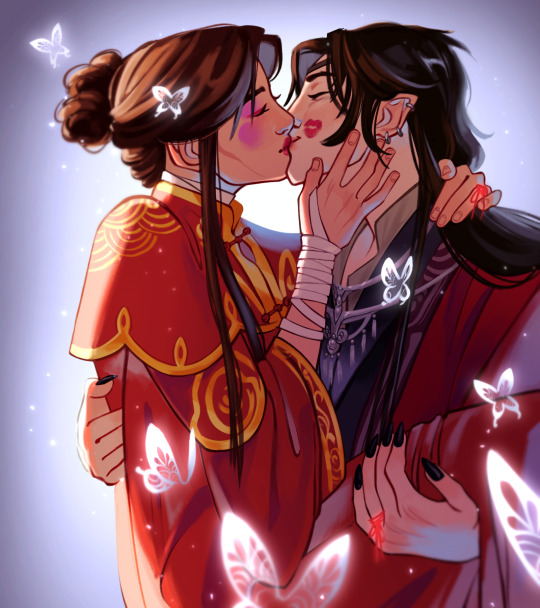
the ghost bridegroom 💋🦋
now available as a print!!
4K notes
·
View notes
Text
Mini Theatre posted by TGCF Audio Drama weibo showing Xie Lian getting makeup done for the Ghost Bridegroom arc.
301 notes
·
View notes
Note
for the ask game, an au where HuaLian's "first" meeting didn't happen during the ghost bridegroom case, or maybe a different way it could have gone
(I've just started the tgcf novel so I'm very excited to see you tgcf posting :D)
1 - About 400 years after Xie Lian was kicked out from the heavens for the second time, his bad luck led him straight to Ghost City and he gets involved into an accident that causes a ridiculous amount of costly damage. Half of the city wants his head on a pike and he is about to fight his way out of this mess when he is offered to work in order to reimburse his debt. Xie Lian finds it fair enough, tries several physical jobs in which he's good but that doesn't make enough money, until he finds the one job that should get him out in less than ten years: host. (Do not question how hosts can exist in this setting.)
2 - Does Xie Lian have any idea of what he is doing? Absolutely not. He still manages to be the most popular host in the entire city. Because he is ridiculously beautiful but also because he is just so nice with everyone??? He genuinely listens to people?
3 - Some time later, Hua Cheng comes back to Ghost City after one of his "Let's look for Danxia" trip and is in one hell of a bad mood because he once again failed to find him. So he is absolutely furious when he hears about a random nobody using the Flower Crowned Martial God's appearance to make some cash. His. God's. Appearance. This is unforgivable. He immediately goes to the establishment, under a disguise, in order to trap then to inflict some horrible karmic punishment on whoever is using a fake skin that will be undoubtedly a pale copy of the crown prince of Xianle... which is why Hua Cheng is taken completely by surprised by Xie Lian's sheer radiance when they met. None of that smooth San Lang business where he psyched himself for a week straight while Black Water and Yin Yu listened to his breakdown over his god's beauty. He didn't have the time to vent all his simpness out of his system and that first meeting almost dissipates the poor guy.
4 - Hua Cheng starts to visit Xie Lian daily, officially to confirm his identity because that could be a mole or an assassin sent by his enemy and because there is 0,001% that someone managed to create a perfect skin of the crowned prince of Xianle. He never wears the same appearance twice (coincidentally, his various disguises are always beautiful and stylish) and is unaware that Xie Lian sees through them every single time.
5 - Hua Cheng keeps giving incredibly expensive gifts to Xie Lian because it's what you're supposed to do when you see a host, right? At least, until Yin Yu points out that if he keeps doing that, Xie Lian will reimburse his debt and leaves by next month.
+ 1 - E-Ming doesn't care about Hua Cheng being a fool and keeps jumping in Xie Lian's lap after escaping a certain ghost king. Xie Lian adores it.
66 notes
·
View notes
Text
Mysterious Lotus Casebook and its many, many doomed weddings
A list of the wedding imagery threaded throughout the tv series:
A midnight wedding party discovers the seven headless bodies outside Yipin Tomb
Cailian Mannor Wedding Dress Murder Case (the brides die)
Ah Fei being sold as a bridegroom for ghost marriages (the bride dies….maybe)
Qiao Wanmian’s Wedding (the bride is poisoned but survives)
The Ghost King’s “Marriage” (the “brides” die)
He Xiaofeng’s Marriage (the groom dies)
Qiao Liqiao’s wedding chamber (the bride dies)
In a 40 episode drama, that’s an average of 1 wedding every 5 episodes
83 notes
·
View notes
Text
Hua Cheng’s Design
Source: 孤世中逢影 Gu Shi Zhong Feng Ying (weibo) on Hua Cheng’s design as based on Miao ethnic group culture - with snippets from a Chinese Documentary on Miao Ethnic People and an interview with Shi sifu, one of the last traditional Miao silversmiths - Sina TV.
Translator: Sythe / NPD Khanh
Hua Cheng’s character design. As we all know, the image of Hua Cheng was established based on the Miao ethnic group, so let's see the specific origin of things on Hua Cheng’s person.
1. Red umbrella:
The red umbrella in Miao culture is one of the indispensable props at marriage and celebrations. The red umbrella symbolizes great auspiciousness as one’s desires, numerous children and grandchildren, sheltering from the wind and rain, exorcising evil spirits, and shielding people from disasters. All of these together are a perfect fit to represent the blessings of the heavens (Tian Guan Ci Fu, the name of the novel) with no taboos or misfortunes.
At the same time, in the opening episode of Tian Guan Ci Fu, Xie Lian mistook Hua Cheng for a bridegroom ghost. The situation fits perfectly like a miracle as a red umbrella is required for a wedding.
2. Silver butterfly, maple leaves.
The Miao people have long had an ancient song, "Feng Mu Ge" (Song of the Maple Tree), to praise the beauty of life. The Miao people also consider butterflies as the ancestral mother, who can bless the village to be peaceful, the children to thrive, and the nation to flourish.
Maple leaves and butterflies represent rebirth, and reincarnation. These motifs can be seen in the culture of the Miao people everywhere, from clothes to jewelry to household decorations. The most famous is the Hong He area, located in an autonomous district of the Miao ethnic group in Yunnan. Whether it is nature or people, maple leaves and butterflies are popular, cherished symbols.
ps. The butterfly decoration that the author saw while traveling in Yunnan is also an inspiration.
"When I was traveling in Yunnan, there was a butterfly decoration in front of the hotel elevator,” Mo Xiang looked at it and thought. After a while, she said proudly, "He will raise a kaleidoscope of butterflies." (From MXTX Author’s Notes and Interview)
3. Silver Jewelry
This goes without saying much, silverware is an important component of Miao culture, "the more beautiful, the better;” "Miao people’s iconic silver jewelry is used to pray for peace and as a token of love or a proposal of marriage.” Speaking of which, Hua Cheng’s character design is based on ethnic Miao people. Of course, the same jewelry is used. The inheritor of the art of Miao silversmithing, Shi sifu, also said, Hua Cheng is steeped in Miao Guang symbolism and aesthetics.


4. Other
If you read the novel, it’s not difficult to figure out:
Huacheng used a red umbrella because when he was young and weak and had nothing. Xie Lian gave him a red umbrella to shield him from the wind and rain.
Hua Cheng uses corral beads because this is one of Xie Lien's lost earrings. In Taoism, coral represents the heart. Taking this into account, Xie Lian in the book had two corral earrings. The implication of this symbolism then becomes quite enticing.
Hua Cheng strung the red string of fated love because, during the Gentle Fragrance part of the book, Xie Lian gently cut a hair strand and gifted it to him. In our country's traditional culture, tying your hair together represents binding marriage. The red line represents your destined intertwined path.
From the beginning to the end, the author demonstrated the changes in Hua Cheng. "Become a better, stronger person because of him, for him". All of Hua Cheng’s character progressions developed according to the plot, gradually revealing layers of meaning, and not built by forced intention. Therefore, in successfully portraying such a character, the author moved the reader’s heart and created a miracle.
A Love that is unchanged even in the face of death.
283 notes
·
View notes
Text
Keanu Reeves - John Wick Masterlist
Keanu reeves:

Misbehaving (Daddy!Dom!Keanu x reader) One-Shot!
John Wick :
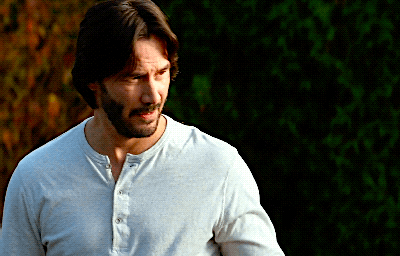
Mini Series:
Lisbon lights (completed)(fluff & romance Assassin!reader) warnings: curse words violence, blood, kidnapping, torture:
Sneak peek
part 1
part 2
part 3
part 4
part 5
part 6
Ghosts serie (completed) (fluff comfort Smutt) warnings: abuse, blood, depression, curse words.
part 1
part 2
part 3
part 4
part 5
Bridegroom's oak tree serie (Mafia Lord!John Wick) HUGE DADDY DOM FROM PART 4 ONWARDS. Warnings: SMUTT 18+, daddy!Dom, mature content. (You can read part 1 and 2 for a basic romance fluff story)
part 1
part 2
part 3
part 4
Citrus, Cauldron and Gun powder (Witch!Reader): Witchcraft, fluff, Smutt. Warnings: blood, dark topics, Witchcraft? Cursing, mature content.
MOODBOARD
part 1
part 2
part 3
part 4
Her teacher (Teacher!John Wick) warnings: Smutt 18+, mature content, curse words, violence, blood, stalking:
part 1
part 2
part 3
part 4
Halloween Special
Requests / One-Shot
Making it up to you (John Wick x Reader one-shot)
Wooden coffee table (John wick x reader)
Sleeping with a friend (John Wick x Reader)
Blood Red Marker and Binary Code (John wick x reader one shot)
#fanfics#fanfic#fanfiction#john wick fanfiction#johnwickgif#john wick x reader#john wick series#john wick x you#keanu reeves fic#keanu reeves x reader
141 notes
·
View notes
Text

Follower Recs
~*~
Stiltonbasket doens’t miss, this one is just so good! @ladyunderthemolehill
travelers through the empty gate
by stiltonbasket (@stiltonbasket)
M, WIP, 90k, Wangxian & Nielan
Summary: Ten years after eliminating the Jiang and Nie clans, Emperor Wen Ruohan is dethroned by a young demonic cultivator from the outlands of Yiling, who surpasses him in both talent and cruelty. Where Wen Ruohan burned his enemies, Emperor Yiling raises his from the dead, and sends them through the imperial city to hunt down every last remnant of the Wen clan that tries to evade his clutches.
The last thing Lan Wangji wants to do with the Yiling huangdi is marry him.
Unfortunately, his family's fall from grace leaves him with no other choice.
~*~
Continuing with another stiltonbasket fic, a tgcf fusion with LWJ as a calamity? Reincarnated WWX? Pining ^ 2? Lovely! @ladyunderthemolehill
【银 劍 探 心】| Silver Jian Seeking Hearts
by stiltonbasket (@stiltonbasket)
M, WIP, 30k, Wangxian
Summary: “A ghost bridegroom?” Wei Wuxian asks, when he receives his latest night-hunting assignment from Uncle Jiang. “Have women been going missing?”
If brides have been going missing, this is the first that Wei Wuxian is hearing about it; which is strange, because the systematic kidnapping of brides should have quickly been recognized as spirits’ work and reported as such to the nearest cultivation sect as soon as possible.
“Three women and ten men have gone missing so far,” his uncle tells him. “Jinshan town is out of our jurisdiction, and the records say there hasn’t been a hunt in the area since before my grandfather’s time. But no one from Jinshan thought to report the disappearances until today, so the victims must be long dead by now.”
-
Four hundred years after the Sunshot Campaign, a reincarnated Wei Wuxian dresses himself in wedding red to defeat the ghost of a bridegroom.
Deep within the forests of Jinshan Mountain, the mourning calamity Yin Jian Tan Xin waits to marry his beloved.
~*~
Scheming NHS sends himself and three others to the past to fix things. @ladyunderthemolehill
Kay's Rec
In My Defence, I Have None (For Never Leaving Well Enough Alone)
by SemiLocalCryptid
T, WIP, 73k, Wangxian
Summary: Wei Wuxian, Lan Wangji, and Wen Ning are unsure of how they feel about Nie Huaisang trapping them in a soul-transferring array that sends them to the past, long before the happy ending they had suffered so much for. Reliving their most traumatic memories is not what they had planned when they went out on a seemingly innocuous nighthunt. But now that they're here, apparently to stay, they have no intention of making the same mistakes twice.
(Or, a Time-Travel AU where Nie Huaisang sends Wei Wuxian, Lan Wangji, Wen Ning, and himself back to their first night at the Cloud Recesses with an agenda: save everyone, especially his brother)
~*~
Scheming NHS Schemes Again but don’t worry, he has a plan! @ladyunderthemolehill
Nie Huaisang's Ten Steps to Fix The Fucked Up Reality
by cosmic_zephyr (astralcelestia)
T, WIP, 62k, Wangxian
Summary:
1. Find the time travel array in the Nie library
2. Convince (manipulate) Wei Wuxian to use demonic cultivation to activate the array.
3. Transmigrate to the body of your 15-year-old selves with Wei Wuxian and Survive his wrath.
4. Come up with yet another exaggerated, slightly concerning, plan to save Lotus Pier, Dafan Wens and your brother.
5. Use Empathy to make the Wen siblings side with you in the mess that is soon to come.
6. Kill the main Wen family and make Wen Qing the new leader of Qishan Wen so innocent people are not killed.
7. Annoy the hell out of Lanling Jin just for funsies and also a political statement because Jin Guangshan can suck it.
8. Preferably, just for your own sanity, find a way to kill Jin Guangshan and Jin Guangyao.
9. Work with Wei Wuxian and Wen Qing to solve the sabre problem of the Nie clan.
10. Live a happy life with your brother alive and the cultivation world not being a huge fucked up mess.
Aka the fic where Nie Huaisang and Wei Wuxian (and Lan Wangji) travel back in time and save the cultivation world. Except the fact that nothing goes according to plan when disaster trio Wen Qing, Nie Huaisang and Wei Wuxian is involved.
~*~
In which the Burial Mounds change WWX to something not human and it won’t be easy to stay in control. Good angst and whump in this one @ladyunderthemolehill
Le Sang du Cygne
by Enfant_Loup
T, WIP, 23k, Wangxian & Nielan
Summary: He could recall with crystalline clarity the cry of the eagles in the blue skies above, the cliffside, and the rocks.
And the beast hiding there, watching him.
A snow leopard.
He remembered the eyes, and the knowledge chilling his spine, that he was in front of a predator. That he was a guest on this mountain. That he could be killed at any moment if the animal wishes so.
Wei Wuxian’s eyes were like this for a second, there and immediately gone again, like sparks dancing fleetingly when tossing wood in a fire.
Wei Wuxian comes back from the Burial Mounds changed, his teeth a little sharper, his eyes a little redder.
~*~
In which WWX leaves the Jiang sect before the CR lectures. I rather like fics that explore different What-Ifs. @ladyunderthemolehill
My heart knows (you’re the missing piece)
by makexianxianhappytoday
T, WIP, 67k, Wangxian
Summary: At a young age, Wei Ying thought that Lotus Pier was his sanctuary. Wei Ying thought wrong.
What if Wei Wuxian had chosen to leave Yunmeng Jiang even before attending the cloud recesses, how does it changes things? Rogue cultivator WWX! fic (for awhile!)
* chpt 1 could be read as a one-shot
* but also im making it into a short series

~*~
(Please REBLOG as a signal boost for these hard-working authors if you like – or think others might like – these stories.)
#Wangxian Fic Recs#follower recs#mdzs#the untamed#follower rec#MDZS#Mo Dao Zu Shi#The Grandmaster of Demonic Cultivation#Wangxian#The Untamed#Chenqingling#CQL#Chenqing Ling#WIP Rec Week#WIP#Work in Progress#travelers through the empty gate#stiltonbasket#Mature#long fic > 50k#Nielan#medium fic 15k-49k#I Have None (For Never Leaving Well Enough Alone)#SemiLocalCryptid#Teen#Nie Huaisang's Ten Steps to Fix The Fucked Up Reality#cosmic_zephyr (astralcelestia)#Le Sang du Cygne#Enfant_Loup#My heart knows (you’re the missing piece)
57 notes
·
View notes
Note
what if…
Red Hood and Jazz discover they were married by an Elvis impersonator ghost…
I have so many questions.
Were they married by an Elvis impersonator willingly and found out he was a ghost later?
Were they married by a ghost and after the ceremony they just whipped out the elvis outfit and was like, "Welp. Gotta fly to my next job. See ya!"
What was their wedding like? Was he a groomsman? Bridegroom? Idk what its called.
438 notes
·
View notes
Text

Day 25. Ghost Marriage/The Phantom Bride.
I think self insert yuu would be a bridegroom or something of the sort, usually I can wear heels almost all day but I thought it would be funny if she complains about them after 20 minutes 🧍♀️
#twistober2023#twistober#twisted wonderland#twst#fanart#twst fanart#twisted wonderland fanart#twst yuu#twisted wonderland yuu#twst oc#twst ghost marriage
37 notes
·
View notes
Text
the moon as resurrection in vampire lore
“Do you think," said an old man to another, "that he will come to life again, eh?"—
"Oh, yes, vampyres always do, and lay in the moonlight, and then they come to life again. Moonlight recovers a vampyre to life again."
"And yet the moonlight is cold."—"Ah, but who's to tell what may happen to a vampyre, or what's hot or what's cold?"
And there was Sir Francis Varney, raising slowly one arm with the hand outstretched towards the moon, as if invoking that luminary to shed more of its beams upon him.
from Varney the Vampire, or the Feast of Blood (1847)
“According to a promise they had given his lordship, that [Ruthven’s corpse] should be exposed to the first cold ray of the moon that rose after his death. Aubrey astonished, and taking several of the men, determined to go and bury it upon the spot where it lay. But, when he had mounted to the summit he found no trace of either the corpse or the clothes.”
from Polidori’s The Vampyre (1816)
Ruthven: Then I shall die content.—Swear then, to conceal my death, until the Moon shall set to-night, then throw this ring into the waves that drench the Tomb of Fingal.
Ruthven: Remember your oath.
The Moon gradually descends
from Planché’s play The Vampire (1820) based on Polidori’s book.
“There is no doubt that vampires seek a union with mortal beings expressly to prolong their existence on this earth. I shall instantly, therefore, seek the fair Aldwinkle, and achieve our marriage. After what I have endured meanwhile, a walk in the soft moonlight will revive me
from W.T. Moncrieff‘s play “The Spectre Bridegroom; or, A Ghost in Spite of Himself” (1821)
“The Sorcerer draws a blue fire circle with his wand round the Tomb—the moon becomes suddenly obscured—a storm begins to howl—owls and other birds of might flap their wings and utter their low voices of doom—the tomb flies apart, leaving a passage for Brunhilda to rise through—the Sorcerer scatters into the yawning earth, roots and herbs of magic power—the wind becomes more boisterous—thunder peals louder—the clouds divide—the moon bursts forth with all her power, and her beams are scattered on the fragments of rock that composed the tomb.)
Brunhilda: You stabbed me to the heart—you buried me;—But when the rite was done—marked you the moon? Her light restored me—but to be revenged!”
from George Blink’s play “The Vampire Bride; or, Tenant of the Tomb” (1830). This was an adaptation of the far more famous story Wake Not The Dead by Ernest Rapauch (1823)
"Know then," continued the sorcerer, "that only on the night of the new moon does she sleep the sleep of mortals; and then all the supernatural power which she inherits from the grave totally fails her. 'Tis then that thou must murder her."
From Rapauch’s Wake Not The Dead (1823)
“The moonlight is seen to tip the highest peaks and creeps down the mountain side; it arrives at the ledge, and bathes the body of ALAN RABY in a bright white light.—After a moment his chest begins to heave and his limbs to quiver, he raises his arm to his heart, and then, revived completely, rises to his full height.
Alan. (Addressing the Moon.) Fountain of my life! once more thy rays restore me. Death!—I defy thee
“The next evening I climbed the mountain, and concealed myself near the spot; he came; again his breast seemed to drink in the moonbeams. I looked close, when I saw here, in his left bosom, just over the heart, was an unclosed wound, as if a pistol bullet had passed through him!
From Dion Boucicault‘s The Phantom (1852)
Most of these come from the book Beyond the Count by Margo Bond Collins. Available in Z Library and Libgen via Anna’s Archive.
#yes i am a vanitas-will-not-die-so-easily truther#but can i possibly be blamed? look at vampires in 19th C. Lit#its SO interesting bc they were more like phantoms or spirits rather than vampires#and how modern day vampires are so bound by the flesh and blood. that was a dracula thing#vanitas no carte#the case study of vanitas#vnc#dracula daily#vampires#vnc meta
61 notes
·
View notes
Text
The myth of Sumire and Hakubo: JSHK chapter 94 and the reinterpretation of “Tales of Ise: Part 6 (Akutagawa)”
Hakubo and Sumire seem to be a point of controversy and confusion among the jshk fandom: from their introduction to the latest chapters, they are a misunderstood and underrated pair, a phenomenon that has only exploded as of chapter 94.
There are many factors, as I see it, that contribute to this... confusion. But in this post, I'll focus on an aspect that is so far, very overlooked, but in my opinion, very important in understanding Hakubo and Sumire: their relationship with the mythical and mundane.
For that, I'll also be comparing chapter 94 with part 6 of the Tales of Ise (Akutagawa).
But before we begin this analysis, I feel we must clear a few concepts.
1. Clearing concepts: Eating and Sex, Death and Marriage
It feels like I'm pointing out the obvious, but just to be safe, let's talk a bit about these metaphors, not only what they generally mean in literature, but how Aidairo apply those metaphors in JSHK.
a) Eating = sex
This… should be the most obvious one. It’s really not that uncommon to see this particular metaphor in… any sort of media whatsoever! Poems, songs, books, movies, series… Maybe you’ve heard instances in literature of wanting to devour someone equating to sexual desire. Or think of vampires, these monsters now synonymous in pop culture to sexual beings, their lust for blood often intertwined with sexual lust. Heck, even stories that come from oral tradition, such as Little Red Riding Hood, have many interpretations that equal the wolf’s eating of the girl to sex.
Still, even without this knowledge, Aidairo does establish plenty of times, both in their AUs and the manga proper, what eating- particularly someone else- can mean within their writing.
Let’s start with the AUs:
In Hanako-kun of Magic: Sweet Witch Banquet, the only way Nene and Aoi can bring back the people they turned into sweets back to normal is to eat them… with the side effect that, for a short amount of time, the people who were eaten will fall in love with those who ate them.
In the Ghost Hotel AU, it’s a little more subtle but it’s still there. There are two instances of monsters eating those they desire. First, there’s Kou, who’s a werewolf in this AU, and apparently can’t resist taking chunks out of Mitsuba the mummy to cook and eat.
Second, there’s Hanako, who’s a vampire in this AU, and who’s stated to have drunk too much blood out of Tsukasa, and later, is implied to bite Nene and do the same to her, trapping her with him in the hotel.
But AUs are not the only place Aidairo have written this metaphor. In the very first chapter, eating a mermaid’s scale together means you’re bound to each other, a bond equated in said chapter to a romantic relationship.
And if that example’s too much of a stretch for you, than look no further than chapter 39: Mokke of the Dead!
In that chapter we have two instances of eating equating to sex and romance. First, when kegare!Hanako going straight to Nene to eat her. The scene is…
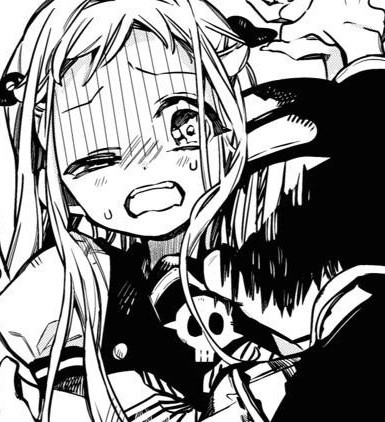
…quite suggestive, Nene even misinterpreted it at first!
Later, we have Akane who, under the influence of kegare, seemingly translates his romantic feelings for Aoi into wanting to eat her.
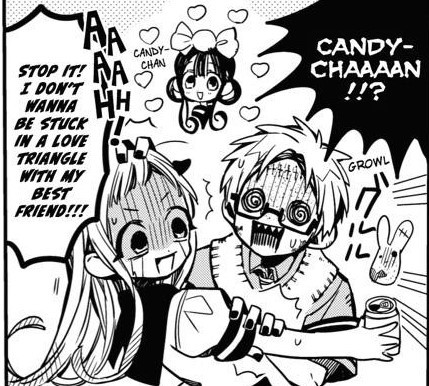
It’s very clear here that Akane’s thinking of Aoi when trying to take a bite out of Nene. Hilariously, Nene herself worries that Akane trying to eat her would result into a love triangle between her, Aoi and Akane.
And last but not least…
THESE PANELS ARE CLEARLY BEING FRAMED AS A SEX SCENE!!
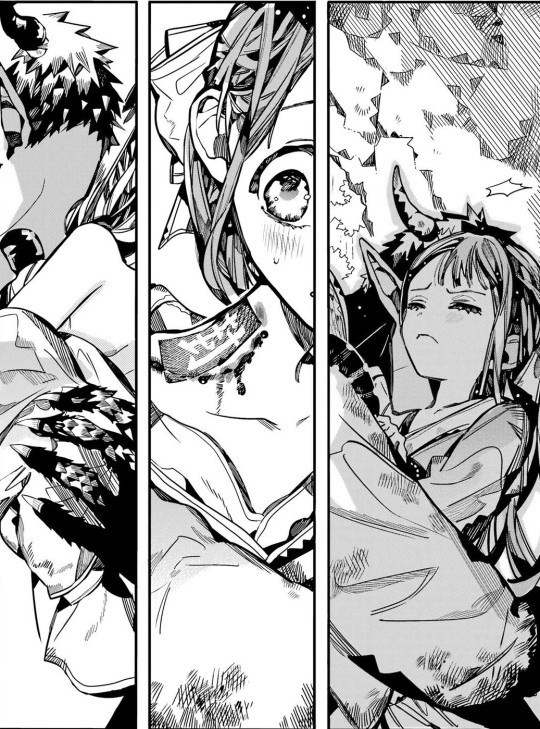
Seriously, how could anyone not see it?
So, yeah, JSHK clearly uses the cannibalism = romance and sex metaphor a lot. But what about death and marriage?
Let’s find out:
b) Death and Marriage
For this one we must turn back in time and go for stories based on oral tradition.
Death and the Maiden is a very famous, frequently used motif in stories. Most iterations of Beauty and Beast use both Death and the Maiden and Animal Bridegrooms in their narratives to make a point.
But basically, death and marriage have been equated in stories for a very long time, to symbolize the cyclical nature of a human’s life- in this case, it often has to do with the end of a woman’s childhood and the start of a new part of her life, as a wife and mother: adulthood, basically.
Think of Hades and Persephone, who are meant to symbolize the cyclical nature of life and death, the coming and going of the seasons and marriage as the end of childhood/maindenhood, but the beggining of something new.
In JSHK, this is also referenced with the Kannagis, usually young women of marriageable age, whose sacrifice is equated to marrying God and returning to his side.
Keep all of this in mind as I ask you: which of the mysteries oversees 'life and death'? Who, in the JSHK universe, is meant to be seen as the main representative of Death? And what character is mostly seen among flowers? What characters are heavily associated with the dual nature of Life and Death?
Hint: it's Hakubo and Sumire.
As No. 6, Hakubo has powers over life and death. Currently, he’s also referred to as a Shinigami, often translated as a “Grim Reaper” or “God of Death”. The term “shinigami” can also have, in literature, a link to suicides and shinjuu. Finally, he’s an Oni. In many stories, often written during/after wars, famines and natural disasters, Oni are featured eating people- in these, Oni are a metaphor for death itself.
So, if we consider Hakubo’s role as a Death deity in the JSHK mythos, we have to ask this question: what happens when Death falls in love?
2.) Chapter 94: The reinterpretation of Tales of Ise Part 6 (Akutagawa)
The 'Tales of Ise' is a uta monogatari (essentially, a collection of poems and other narratives) composed of more than 100 episodes, some of which date back all the way to the Heian period.
Among those poems, there is one in particular Aidairo chose to allude to and reinterpret in their manga: Episode 6 (Akutagawa). The story below (translated by Helen McCulough) shares certain beats with chapter 94:
A certain man had for years courted a most inaccesssible lady. One pitch-black night he finally spirited her out of her apartments and ran off with her. As they passed a stream called the Akutagawa, She caught a glimpse of a dewdrop on a blade of grass and asked him what it was.
The journey ahead was long, the hour had grown late, and a torrential rain was pouring down, punctuated with frightful peals of thunder. The man put the lady inside a ruined storehouse and stationed himself in the doorway wiht his bow and quiver on his back, never dreaming that the place was haunted by demons. But while he was standing there longing for daybreak, a demon ate the lady up in one gulp. A thundercap muffled her scream of terror.
When the sky finally began to lighten a bit, the man peered inside and saw that the lady was gone. Frantic with helpless grief, he recited,
When my beloved asked,
"Is it a clear gem
Or what might it be?"
Would that I replied,
"A dewdrop!" and perished.
There are quite a few beats that match, no? A couple that isn’t allowed to be together is stranded by the rain, but it ends unexpectedly as the woman is eaten by an oni.
Now, before any of you look at this superficially, have a "gotcha!" kind of reaction and try to use it as proof that Hakubo didn't love Sumire or that Sumire was eaten against her will, let me reiterate that not only chapter 94 is a reinterpretation of this tale, but also that Aidairo has done this sort of thing before.
Aidairo loves to reference all kinds of stories in JSHK. The 'Little Mermaid' is thematically very important to Nene's character, part of the short story 'Takasebune' is narrated by Amane during the Picture Perfect arc, the myth of 'Orpheus and Eurydice' is alluded to twice, first with Akane and Aoi, then with little Tsukasa, Nene and Kou.
Most obviously, we also have the urban legend of 'Hanako-san' right in the first chapter.
What do all these instances have in common? The answer is simple: they all are reinterpretations of the original tales.
For example: both with Akane and Aoi, and the trio of Nene, Kou and little Tsukasa, we have an allusion to the famous scene of Orpheus looking back to see Eurydice, only to find her gone.
The differences in these interpretations lie on many factors, but most heavily on the characters taking the role of ‘Eurydice’. Although she was essentially kidnapped, Aoi still was passively suicidal, and later even lashed out at Akane and Nene, who were trying to rescue her. Likewise, Tsukasa actually knew the way to get back to his family, he only chose not to until Kou and Nene convinced him to do otherwise.
By giving Aoi and Tsukasa more agency than the character of ‘Eurydice’ had in some known versions, this allows for a more complex and nuanced narrative without taking the tragic elements out of it. That said, to outsiders, these situations might look like a version of ‘Orpheus and Eurydice’ played completely straight: a tragedy about a poor, helpless thing taken too soon against their will, not particularly nuanced nor too complex.
Chapter 94, similarly, transforms the chapter of Akutagawa into a more complex and nuanced story by giving both Hakubo and Sumire more agency, even if, to outsiders, it might look like it was just the tragic tale of a poor innocent girl being trapped and eaten by a monster.
And this where we can see the differences between the two stories.
The woman in the chapter ‘Akutagawa’ is a tragic figure… but her voice can barely be heard anywhere in the narrative. The only things we know about her are that: one, she was implied to be of a much higher status than the man, and two, that she was apparently so sheltered and isolated, she’d never seen a dewdrop before in her life. The man mourns not explaining to her what a dewdrop was.
Sumire was, indeed, from a family of much higher status than Hakubo, who was essentially a slave to the Minamoto clan and their village. Sumire was also, very sheltered and isolated throughout her entire life.
But Sumire’s status within the village was simultaneously very similar to Hakubo’s own: she was nothing but an object to be sacrificed, mostly referred as a Kannagi by her fellow humans. And although she was sheltered and isolated, Sumire hilariously began her relationship with Hakubo as the one with more basic living skills (cooking, laundry, cleaning).
Sumire, most importantly, knew Hakubo was an oni from the very beginning, and again and again proclaimed her love for him, knowing very well what, who and how he is.
While Sumire is meant to represent the woman in the tale, Hakubo is meant to be both the man eloping with the woman he loves and the oni who eats her.
Hakubo, like the man in ‘Akutagawa’, pines for a woman he cannot be with: not as kaii who loves a human, not as the one in charge of seeing her off as a Kannagi. Hakubo had wished to take Sumire’s hand and run away from their village, to ‘spirit her away’ much like the eloping couple did. And ultimately, so they would not be separated again, Hakubo eats Sumire, as the oni ate the woman.
It’s very poignant, I think, that Hakubo represents both the man and the oni from ‘Akutagawa’. The entire irony of his monologue in chapter 94 lies in the fact that he didn’t need to be a human man to do any of those things: he managed, in his own way, to do them all.
He laments not being able to cry for Sumire, while his face has been permanently marked, two thin tears streaks forever burned in his visage.
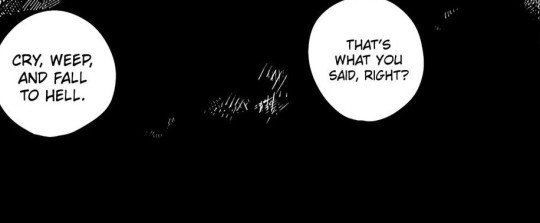
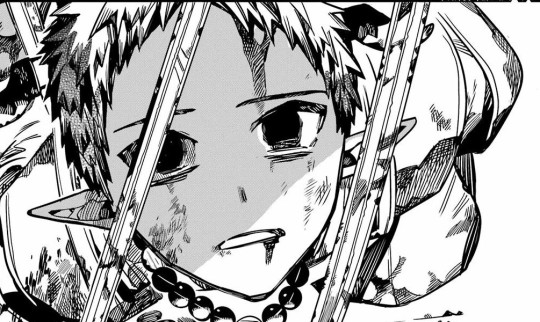
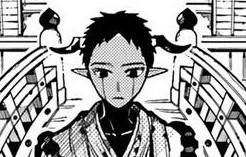
He wishes he could’ve grown with her, and yet, did he not grow? Learning with and from her, how to take care of himself and her, discovering and developing feelings and desires buried deep within him? Does he not seem older, comparing before and after he met Sumire, physically, mentally, emotionally?
He says he wished he could’ve laughed with her too, dismissing how, moments ago, he was actually smiling and playful, the happiest we’ve ever seen him be as he recalls precious memories with Sumire.
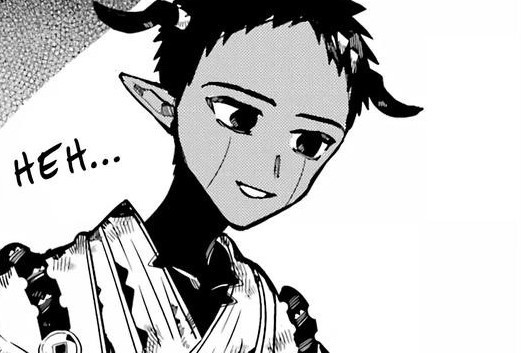
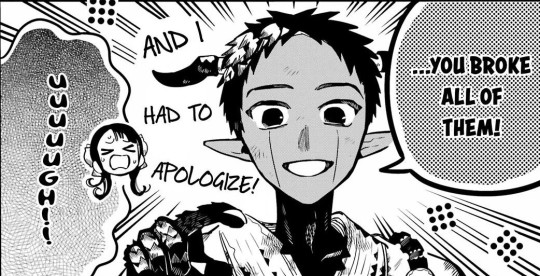
‘I would’ve clung to you and cried as you were sacrificed’ he says as his boundary itself weeps, trapping her in a cave with him, as if begging her not to leave him again.
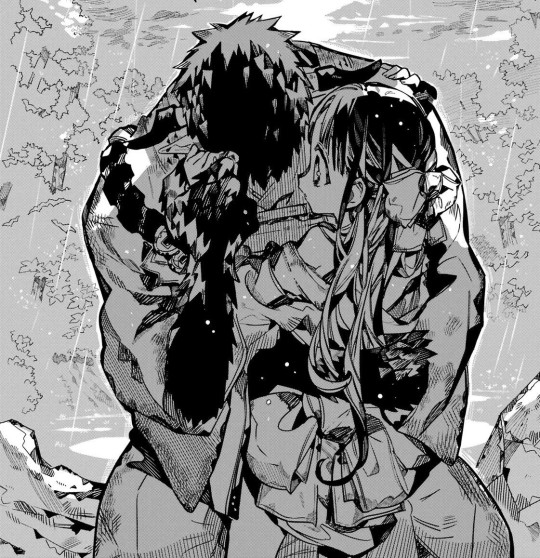
…‘I would even have fallen in love with you like a human man would’ he confesses, as he devours her, usurping the River God of the village as her husband, after kissing her like a man starved, after confessing to be under her spell.
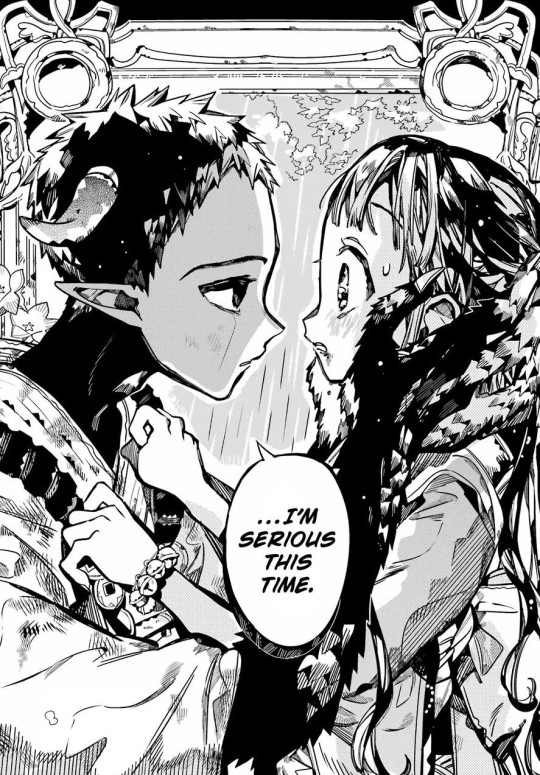
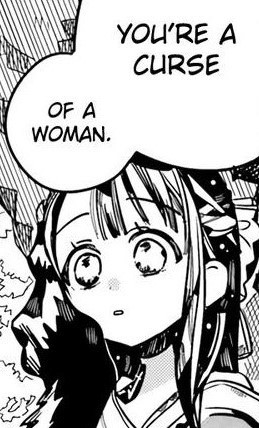
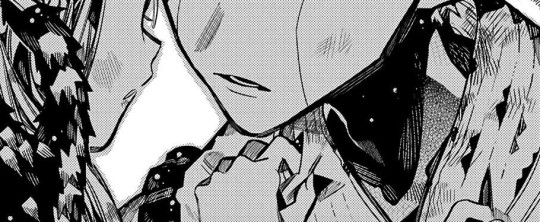
Hakubo represents both man and oni because he was both, because, in JSHK, kaii and human truly aren’t all that different.
…Hakubo is also the woman, ignorant of his own heart, as she was of the world outside.
Sumire is also the man and the oni, at once guiding and haunting Hakubo.
The reinterpretation of ‘Akutagawa’ in chapter 94 is not meant to lend a cynical view on Hakubo and Sumire’s relationship and feelings for each other.
Instead, it is meant not only to reinforce that they loved each other, but also finally get some agency, after a lifetime of abiding to their village’s will.
It is also important to note that chapter 94 is, in many ways, a do-over of chapter’s 89 ending for both Sumire and Hakubo.
Once again, they’re placed in a situation where a higher power dictates that Sumire must be sacrificed and that Hakubo shall oversee said sacrifice. Sumire even says:
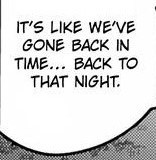
Both Hakubo and Sumire had many regrets about that day. Feelings unspoken, the sin of inaction… the loop present in their boundary symbolizes how neither ever moved on from that night, from their regrets.
When faced with the same situation once again in chapter 94, Hakubo and Sumire decided to take their fates into their own hands, with the cards they were dealt. Unlike their past selves, and unlike the man and the woman in ‘Akutagawa’, Hakubo and Sumire at last gained some agency.
It isn’t a tragic ending, although I don’t see it as truly happy either. Like many things in their lives, it was bittersweet.
3.) Nature vs Nurture: the significance of the rumors and the “right way” to love someone
I've seen some people completely miss the point and think that Hakubo's nature as an Oni means he's incapable of loving someone. The same people also completely ignore the sort of environment he grew up in.
First, and as a quick note, I find this panel very interesting:
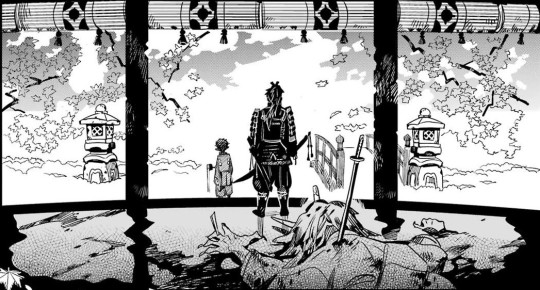
It has struck with me for quite some time now, Shuten Doji’s pose. It looks like he was reaching in Hakubo’s direction, almost as if to warn him or protect him. How odd if you think that Oni apparently aren’t capable of love.
But regardless of nature and what love might innately mean to an Oni, we should also take a look at Hakubo’s formative years:
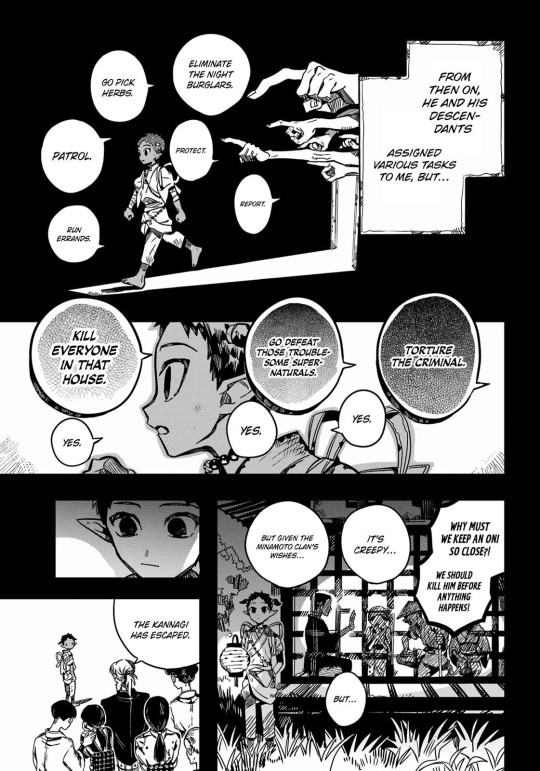
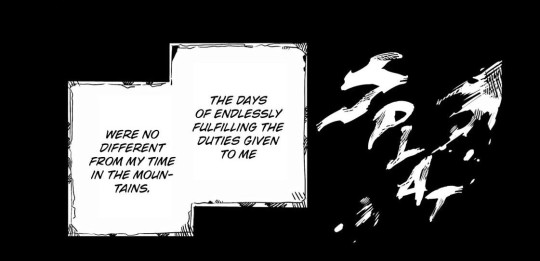
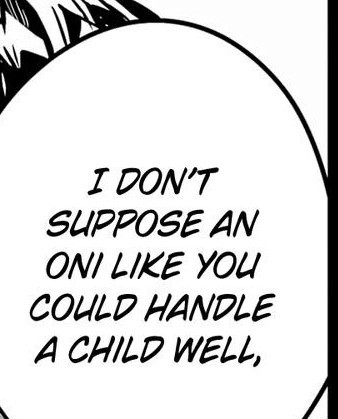

A slave, a tool to be used, Hakubo not only equates the humans to the mountain Onis, he also grows up hearing again and again that he’s a monster incapable of understanding humans, that he’s different, he’s unfeeling.
How the hell was that not supposed to affect how Hakubo viewed himself?
(something, something, call someone monster enough times, and they'll actually become one)
The manga never really discards either nature and nurture when it comes to their characters, and with Hakubo, it is both his dense nature and his alienating non-upbringing that turns him into the mess he is.
By the way, we’re absolutely meant to compare the villagers talking about Hakubo to the students spreading rumors. The way they call him creepy, the panel where only the hands of the villagers are shown... it kinda reminds me of Shijima-san's flashback.
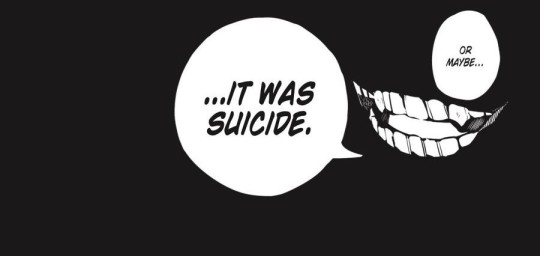
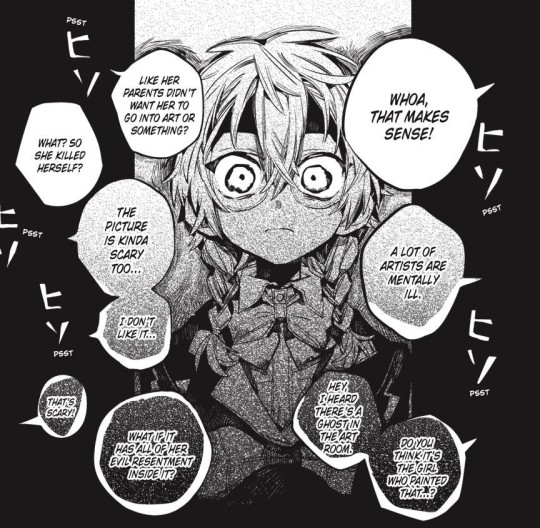
This last image also low-key reminds me of the scene where the villagers are celebrating Sumire's death. I think Akane's steadyfast belief that kaii don't value life and his implict belief that humans value it will be put in question by either or both Shijima and Hakubo. But that's a whole other thing.
And just in case you missed, here’s a little montage of humans and supernaturals being compared:
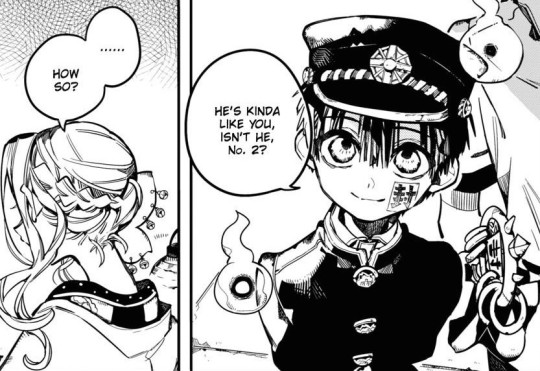
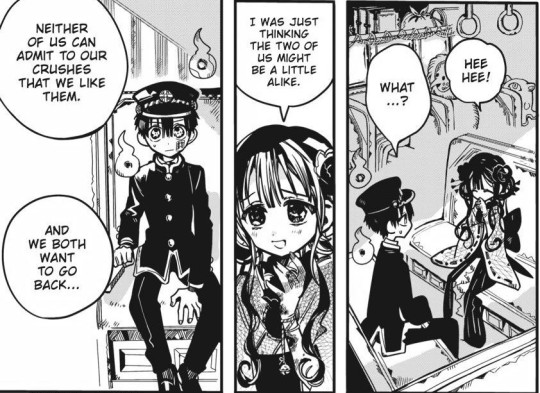
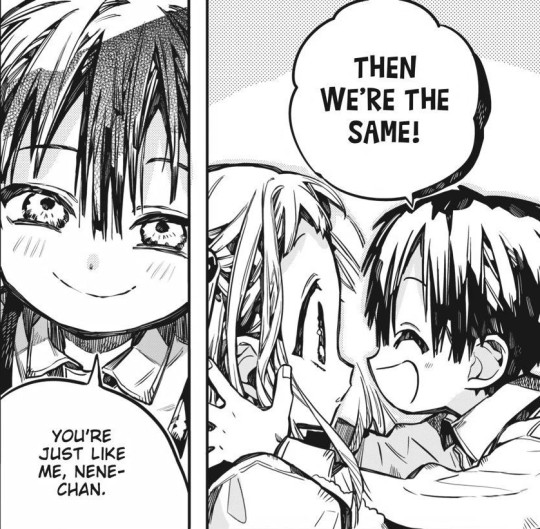
Kou is ‘kinda like’ Yako, Aoi and Hanako 'might be alike’, Nene and Tsukasa are the same.
Humans and supernaturals are compared so many times in this manga, and every single time we see that they’re not really that different. All of them have someone they love- all of them.
Considering this, I must ask: just what is “truly loving someone” in the world of JSHK? What is the “right” way to love someone in the manga, presented by the text?
And just which characters have managed to love someone the “right” way?
Is it Yako, who has tried to bring Misaki back in the shadiest way possible, by harming students and building a fake body?
Is it Tsuchigomori, who never put anything in line to help Amane?
Is it Shijima, who tried to kill Mei?
Is it Akane, who stalks Aoi, constantly changes himself for her and beats up her admirers? Is it Aoi, who has stabbed him, and simultaneously kept him at arms length and lead him on for years?
Is it Natsuhiko, who tried to drug Sakura and is okay with her destroying humanity as long as he gets a date? Is it Sakura, who is cold and violent towards Natsuhiko, while not letting him go?
Is it Kou, who calls Mitsuba a ‘fake’, tries to commit suicide to appease his guilt, and is a low-key bully to him? Is it Mitsuba, who kidnapped Kou and wants Kou to accept him just because he’s lonely?
Is it Teru, who tortured Akane on a daily basis and tries to control Kou’s life?
Is it Nene, who fell for the first boy who gave her attention, can be frivolous and shallow when it comes to romance and is always making excuses for Hanako?
Is it Tsukasa, who’s love-starved, obsessed and willing to destroy and manipulate everything and everyone to make Hanako happy?
Is it freaking Hanako, who killed Tsukasa, who tried to imprison Nene and who is creepily possessive of both?
…Is it Sumire, who wished to a submissive, obedient Oni to fall into hell for her and was blissfully happy when she found out he did just that?
...Is it Hakubo, who cannot express or understand himself clearly, and struggles with his feelings just like any other character in this manga?
If you’ve read any of those and tried to justify something, or if your gut reaction was “well, it’s more complicated than that…”, or if you thought that this doesn’t mean the feelings of love weren’t there, even if warped or twisted…
Then, congrats, you got it!
Pretty much no character has a truly healthy idea of love in the manga- all the romances… all the main relationships so far have been at least a little bit messed up.
But something JSHK has not done so far is put any of its couples in the “failed romance/not true love” box. It has played with concepts of selfishness vs. selflessness, yes, but it has never disregarded the feelings of those involved as not love.
The only time I remember that Aidairo explicitly told the audience that something wasn’t love was through Nene in the very first chapter… when she admitted she didn’t know anything about her old senpai or Teru, nor did she bother getting to know them.
This is a manga about people who are on the way to discovering themselves and who have no idea how to communicate nor express love in a healthy manner. Trying to divide characters and relationships into “true love” and “not-true love” is… terribly inane.
Furthermore, trying to say that any character is incapable of love in JSHK is, to me, going against one of the core themes and messages of the manga: that everyone loves and is loved.
And speaking of themes, let’s talk about Hakubo and Sumire’s role as the culmination of JSHK’s themes, thesis and messages.
4.) Hakubo and Sumire: JSHK’s blueprint
This one will be brief, but it should be said. If you’ve paid any attention to JSHK, you’ll notice that Aidairo love their parallels. They use it everywhere, to drive a few points and get their themes across better.
These parallels also serve to connect all the characters narratively and thematically. But, the king and queen of parallels in this manga are Hakubo and Sumire. Go ahead, compare them to any character or relationship in the manga, and you’ll see what I’m talking about.
Basically, Sumire and Hakubo serve as mirrors and foils to all the important characters and relationships we’ve seen so far… actually, even minor ones, since they also have parallels with Yorimitsu.
Hakubo’s and Sumire’s narratives and relationship are meant to illustrate all the themes of the manga in one duo. So, when I really think about it, the thought of Aidairo saying that Hakubo/Sumire are a “doomed/failed romance” or that Hakubo and Sumire didn’t love each other is… absurd! Why make the embodiment of your work’s message and themes into something cynical, when JSHK has such hopeful undertones, especially when it comes to love? Doesn’t make sense to me.
Instead, I propose the opposite: Hakubo and Sumire are meant to illustrate that relationships between kaii/human are possible, that they can understand one another and that everyone is capable of loving and being loved.
5.) Conclusion
JSHK chapter 94 is meant to be a reinterpretation of chapter 6 of ‘Tales of Ise’ (Akutagawa). This retelling is meant to give more agency to Hakubo and Sumire as they choose to end things on their own terms, while finally having some sort of closure regarding each other’s feelings: Hakubo and Sumire loved each other and were loved by one another.
This reinterpretation also reiterates Hakubo and Sumire’s role as both the culmination of JSHK’s themes/messages and as part of the folklore/mythos of the manga.
Finally, the themes of nature vs nurture and kaii vs humans are explored within Hakubo’s speech to Sumire, where we are meant to question whether it was necessary for him to be human in order to love Sumire or if he, as an Oni, managed to do it, regardless of what the world and Hakubo himself believe about oni/kaii.
While confusing sometimes, I believe Hakubo/Sumire are the key to understanding JSHK’s themes, messages and possible endings better, so it is vital that we look at them carefully.
Also, on a side note, I do not believe that chapter 94 will be the last we’ve seen of these two, and I’m not necessarily talking about flashbacks.
When it comes to a manga like JSHK, which deals so much with the afterlife, plays with our notions of “life and death” and has so much time traveling, not to mention time-loops… I’m always hesitant to say that a character is truly gone. After all, Mitsuba has ‘died’ how many times already in the manga proper?
And considering the other instances of characters fusing upon eating the other, and the fact that Hakubo not only oversees ‘Life and Death’, but also that his powers haven’t been properly used for the plot yet… there’s so much that’s gone unanswered about those two… and there’s this panel that shall haunt me forever:
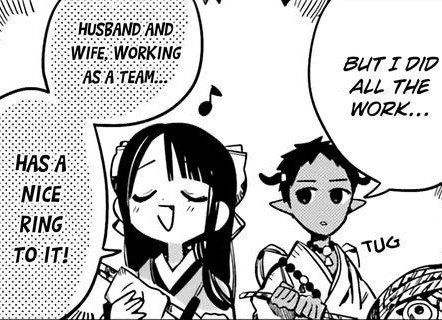
(Me, after seeing how deeply connected to the number six both Sumire and Habuko are: What the hell does this mean, Aidairo?! Come back and give me my husband-wife team!!)
Only time will tell. Who knows, maybe that’s the end and Aidairo was just messing with me. But I digress.
The purpose of Hakubo and Sumire in this manga is clear to me: not to makes us fearful and cynical for a ‘bad end’, but hopeful for a good one.
Now, whatever that would be for our characters is a whole other story.
137 notes
·
View notes
Text
So my guilty ship from TGCF is Mulian. I love the dynamic between them and in the revised we got so much of Mu Qing caring for and being protective of Xie Lian and Xie Lian praising Mu Qing so much that my Mulian heart is savoring every one of those moments.
There is this one scene where Fu Yao (Mu Qing) sees Xie Lian's injuries and he is like "Who did this to you?"
And another scene where Xie Lian is praising Mu Qing to the moon and back.
In the revised version Fu Yao warned Xie Lian about Pei Xiu instead of Nan Feng.If anyone has heard the audio drama there is this whole scene of Xie Lian and Fu Yao joking around when Xie Lian is in his bridal dress during the ghost bridegroom arc.
I love Hualian with my whole life and sometimes MuLian makes me go crazy for their dynamic.
62 notes
·
View notes
Note
My week has been super long already but seeing those two updates were just !!!! I am absolutely loving Mace in Death sent the bridegroom and hourless houses has been one of my favorites for a long time so just thank you for all of your hard work and lovely stories!
I hope your week gets better! 💗
When the Mandalorian guards come to fetch Xanatos, Granta slips away.
Xanatos has long since honed his ability to at least see his son, even if he can't sense him, but even he misses the exact moment when it happens, when Granta focuses himself and disappears from every mind present like a ghost. One moment he’s there, lounging against the wall as Padmé and Dormé do one last check of the wedding robes as the Mandalorians and a squad of clones try to hurry them out the door, and the next Xanatos is letting Padmé help him out of the speeder, kilometers away, and only just remembering that he has a son at all.
It's been a very long time since Granta turned his ability on Xanatos, but it never manages to be any less alarming.
“Prince Xanatos?” Padmé asks quietly, catching Xanatos’s arm as he almost falters. She’s back in her finery, places traded with Sabé, and her eyes are worried as she watches him beneath the canopy of lights.
“Forgive me, it’s harder to move than I had remembered,” Xanatos says smoothly, which is only mostly a lie; the outer robe is long and sweeping and heavy, but the inner one is light silk that Padmé herself recommended, the sides split to allow for freedom of movement. Xanatos spent years as First Citizen in even heavier, more ornate costumes, and this isn't nearly enough to trip him up.
But. Granta is gone from the wedding escort, and Xanatos didn’t even think of him in the last half an hour, he erased himself so thoroughly.
There was no explicit goodbye, but—that’s all right, Xanatos tells himself. They knew there wouldn’t be, seeing as no one is meant to realize Granta is gone until it’s too late. He wasn’t able to say a farewell to Ahsoka, Barriss, or Katooni either, and it’s simply something to live with, well worth their safety in exchange.
30 notes
·
View notes